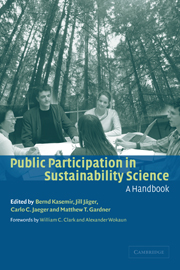Book contents
- Frontmatter
- Contents
- Notes on contributors
- Foreword: science, participation, and sustainability
- Foreword: sustainability, energy use, and public participation
- Preface
- Acknowledgments
- Part I Concepts and insights
- Part II Experiences with IA Focus Groups
- Part III Further forms of participation
- Part IV Future perspectives
- Introduction
- 11 From projects to program in integrated assessment research
- 12 Citizen participation and developing country agendas
- 13 Linking the citizen to governance for sustainable climate futures
- References
- Index
Introduction
Published online by Cambridge University Press: 22 September 2009
- Frontmatter
- Contents
- Notes on contributors
- Foreword: science, participation, and sustainability
- Foreword: sustainability, energy use, and public participation
- Preface
- Acknowledgments
- Part I Concepts and insights
- Part II Experiences with IA Focus Groups
- Part III Further forms of participation
- Part IV Future perspectives
- Introduction
- 11 From projects to program in integrated assessment research
- 12 Citizen participation and developing country agendas
- 13 Linking the citizen to governance for sustainable climate futures
- References
- Index
Summary
This final part of the present volume looks at the research described in the earlier parts, especially the work on IA Focus Group procedures, from a bird's-eye perspective, and explores its meaning for the future development of integrated assessment and sustainability science. In Chapter 11, van Asselt and Rotmans discuss the role of this research for the development of a broader research program of integrated assessment. As an example, they describe how this research has helped them build a bridge between earlier work on integrated modeling and uncertainty, and more recent research on “integrated visions for a sustainable Europe” that combines stakeholder participation with modeling work. While their work, like the bulk of the research on public participation in sustainability science discussed in this volume, has been conducted in Europe, in Chapter 12 Ramakrishna discusses what role citizens of developing countries can play in sustainability debates. He explores similarities and differences between the research discussed throughout this volume and experiences in the developing world, and from this draws conclusions on how increasing public participation could support understanding and collective action toward sustainability, particularly in developing countries. Finally, in the concluding Chapter 13, Stoll-Kleemann, O'Riordan and Burns assess the general potential of increasing the role of citizens in shaping a sustainable future. They argue that interactive, multilevel governance is essential in tackling the sustainability challenge, and that the experiences discussed in this book can help us understand how this might be achieved.
- Type
- Chapter
- Information
- Public Participation in Sustainability ScienceA Handbook, pp. 213 - 214Publisher: Cambridge University PressPrint publication year: 2003

